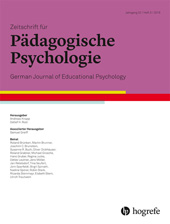Abstract
Zusammenfassung.Need for Cognition (NFC) beschreibt interindividuelle Unterschiede in der Freude an und der Beschäftigung mit anspruchsvollen kognitiven Aufgaben. Bisherige Forschung im akademischen Kontext untersuchte NFC vorrangig im Zusammenhang mit kognitiven und leistungsbezogenen Variablen. In dieser Studie wurde hingegen die Bedeutung von NFC für Erfolg im Studium insbesondere für subjektives Erleben untersucht. Für ein besseres Verständnis wurde die vermittelnde Rolle der regulativen Merkmale Selbstkontrollkapazität, Strategien der Emotionsregulation und Copingverhalten geprüft. Untersucht wurden Lehramtsstudierende (N = 167) als Gruppe, die bereits im Studium eine erhöhte Beanspruchung zeigt. Erwartungskonform hing NFC mit fast allen regulativen Merkmalen zusammen. Bezogen auf Studienerfolg wurden die Annahmen nur teilweise bestätigt: NFC war mit besseren Studienleistungen und einer höheren subjektiven Leistungsfähigkeit assoziiert. Dabei wurde die Vorhersage wahrgenommener Leistungsfähigkeit über regulative Merkmale vermittelt. Zukünftige Studien sollten untersuchen, weshalb in dieser Stichprobe nur ein Teil der Erlebensaspekte mit NFC zusammenhingen und die Ergebnisse für Studierende anderer Fächer prüfen.
Abstract.Need for Cognition (NFC) describes interindividual differences in the enjoyment of and engagement in cognitively demanding tasks. Previous research examined primarily relations of NFC to cognitive and performance-related variables. The current study investigated the relevance of NFC for affective indicators of study-related success. Additionally, we tested the mediating role of regulative variables, that is, self-control capacity, strategies of emotion regulation, and coping behavior. The sample consisted of teacher students (N = 167), a group that has been shown to experience increased stress levels already in their studies. NFC was associated with almost all regulative variables. Concerning study success, higher NFC went along with better study performance and increased self-evaluated efficacy. NFC predicted subjective accomplishment via some regulative variables. Future studies should examine also students of different subjects and try to figure out why only some subjective indicators of success were associated with NFC in the current sample.
Literatur
(2009). Emotion Regulation Questionnaire – Eine deutschsprachige Fassung des ERQ von Gross und John. Diagnostica, 55 (3), 144–152.
(2009a). High-school students' need for cognition, self-control capacity, and school achievement: Testing a mediation hypothesis. Learning and Individual Differences, 19 (1), 135–138.
(2009b). Messung dispositioneller Selbstkontroll-Kapazität. Eine deutsche Adaptation der Kurzform der Self-Control Scale (SCS-K-D). Diagnostica, 55 (1), 2–10.
(2012). Passionate thinkers feel better: Self-control capacity as mediator of the relationship between need for cognition and affective adjustment. Journal of Individual Differences, 33 (2), 69–75.
(1994). Need for Cognition: Eine Skala zur Erfassung von Engagement und Freude bei Denkaufgaben. Zeitschrift für Sozialpsychologie, 25 (2), 147–154.
(2009). Ausbildungs- und Berufserfolg im Lehramtsstudium im Vergleich zum Diplom-Studium – Zur prognostischen Validität kognitiver und psycho-motivationaler Auswahlkriterien. Zeitschrift für Erziehungswissenschaft, 12, 82–110.
(2000).
Skalenhandbuch zur Belastung von Schülern und Lehrern. Das Erfurter Belastungs-Inventar (EBI) . In H., WeishauptP., Zedler (Hrsg.), Erfurter Materialien und Berichte zur Entwicklung des Bildungswesens (Band 2). Erfurt: Pädagogische Hochschule Erfurt.(2009). How need for cognition and perceived control are differentially linked to emotional outcomes in the transition to retirement. Motivation and Emotion, 33 (3), 320–332.
(1996). Dispositional differences in cognitive motivation: The life and times of individuals varying in need for cognition. Psychological Bulletin, 119 (2), 197–253.
(2004). The need for cognition and life satisfaction among college students. College Student Journal, 38 (2), 203–206.
(1996). Individual differences in intuitive-experiential and analytical-rational thinking styles. Journal of Personality and Social Psychology, 71 (2), 390–405.
(2013). Need for cognition: Its dimensionality and personality and intelligence correlates. Journal of Individual Differences, 34 (4), 230–240.
(2017). Cognitive Investments in Academic Success: The Role of Need for Cognition at University. Frontiers in Psychology, 8: 790.
(2003). Individual differences in two emotion regulation processes: Implications for affect, relationships, and well-being. Journal of Personality and Social Psychology, 85 (2), 348–362.
(2013). Faktorstruktur und Gütekriterien der deutschen Übersetzung des Maslach-Burnout-Inventars für Studierende von Schaufeli et al. (MBI-SS). PPmP – Psychotherapie · Psychosomatik · Medizinische Psychologie, 63 (2), 77–84.
(2013). Coping strategies and psychological well-being among teacher education students: Coping and well-being in students. European Journal of Psychology of Education, 28 (4), 1127–1140.
(2012). Profile der Anforderungsbewältigung zu Beginn des Lehramtsstudiums. Journal für Bildungsforschung Online, 4 (2), 84–119.
(2017). Need for cognition in children and adolescents: Behavioral correlates and relations to academic achievement and potential. Learning and Individual Differences, 53, 103–113.
(2013). Wer entscheidet sich für ein Lehramtsstudium – und warum? Eine empirische Überprüfung der These von der Negativselektion in den Lehrerberuf. Zeitschrift für Erziehungswissenschaft, 16 (1), 157–184.
(2006). Academic underachievement: Relationship with cognitive motivation, achievement motivation, and conscientiousness. Psychology in the Schools, 43 (3), 401–411.
(2007). Im Studium wenig engagiert – im Beruf schnell überfordert. Studierverhalten und Karrieren im Lehrerberuf – Kann man Risiken schon im Studium prognostizieren?Forschung aktuell, Heft 3/2007, 60–64. Zugriff unter http://www.forschung-frankfurt.uni-frankfurt.de/36050068/Im_Studium_wenig___12_.pdf
(2015). psych: Procedures for Psychological, Psychometric, and Personality Research (Version 1.5.1). Evanston, IL: Northwestern University. Zugriff unter http://CRAN.R-project.org/package=psych
(2014). Burnout risk among first-year teacher students: The roles of personality and motivation. Journal of Vocational Behavior, 85 (1), 85–92.
(1999). Auswahl von Studienanfängern durch Universitäten – Kriterien, Verfahren und Prognostizierbarkeit des Studienerfolgs. Zeitschrift für Differentielle und Diagnostische Psychologie, 20 (3), 172–191.
(2015). Die Entwicklung beruflicher Selbstregulation: Ein Vergleich zwischen angehenden Lehrkräften und anderen Studierenden. Zeitschrift für Pädagogische Psychologie, 29 (3–4), 151–162.
(2012). Burnout-Risiko von Lehramts- und Jurastudierenden der Anfangssemester. Prävention und Gesundheitsförderung, 7 (3), 203–208.
(2012). lavaan: An R package for structural equation modeling. Journal of Statistical Software, 48 (2), 1–36.
(2002). Burnout and engagement in university students: A cross-national study. Journal of Cross-Cultural Psychology, 33 (5), 464–481.
(2003). Searching for the structure of coping: A review and critique of category systems for classifying ways of coping. Psychological Bulletin, 129 (2), 216–269.
(2017). Cognitive engagement mediates the relationship between positive life events and positive emotionality. Frontiers in Psychology, 8: 1861.
(2017). Need for Cognition as a moral capacity. Personality and Individual Differences, 117, 42–51.
(2013). Investment and intellect: A review and meta-analysis. Psychological Bulletin, 139 (4), 841–869.
(1996). Identifikation und Erfassung von Komponenten der Studienzufriedenheit. Psychologie in Erziehung und Unterricht, 43 (1), 1–22.



